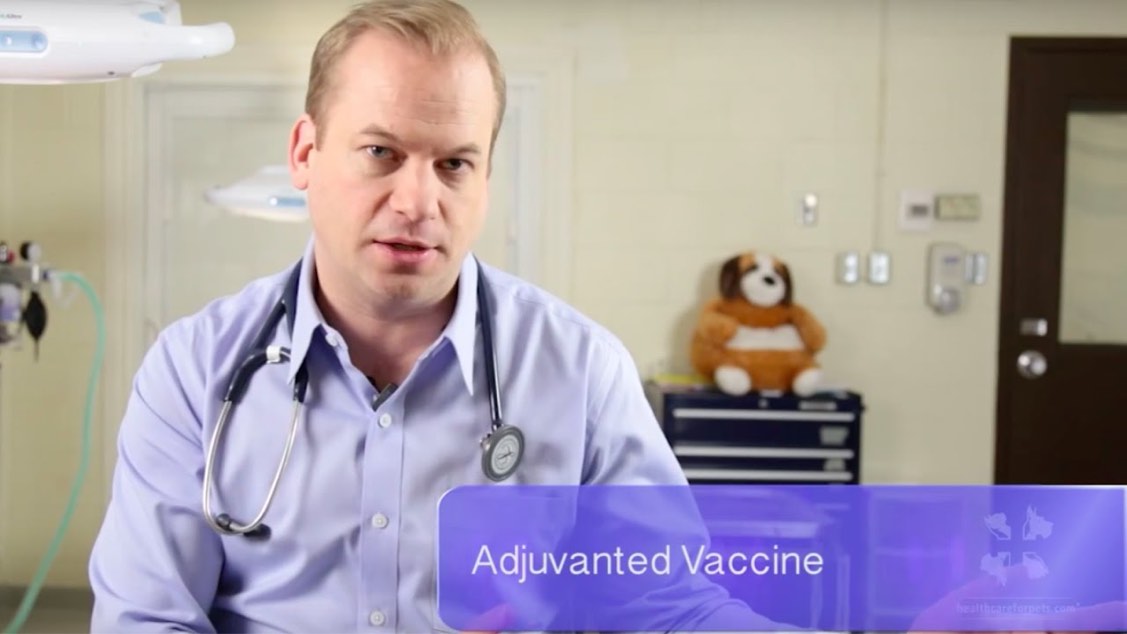-
Vaccine Reactions in Dogs and Cats
-
By: Dr. Clayton Greenway, B.Sc., DVM | Nov 1, 2016
-
Dr. Greenway discusses vaccine reactions in dogs and cats including the two main types of reactions to look out for; anaphylactic and cell-mediated reactions. This video also highlights the more common short-term symptoms and more serious long-term symptoms to keep an eye on after your pet has been vaccinated.
TRANSCRIPT:
I’m Dr. Clayton Greenway with healthcareforpets.com. What I’m going to talk about now is reactions to vaccines and this is something that I see every client is concerned about. It’s one of the details that makes them not want to over-use vaccines.
There are risks associated with vaccination but they are largely outweighed by the benefits of vaccines. There are two types of reactions that can occur. They’re called anaphylactic and cell-mediated reactions. Anaphylactic reactions occur instantly after receiving a vaccine and in some cases they can be deadly. Cell-mediated reactions build over time upwards of twenty-four hours to even a couple days later after vaccination.
The most common reactions you’ll see with vaccination are short-term and not very serious such as lethargy, fever, sluggishness and reduced appetite. These are things that we may experience after vaccination and you may see them in your pet. This is nothing to be concerned about, they’ll recover from that fairly easily. More serious reactions would be things like excessive pain or lethargy that lasts more than 24 hours and I would want you to contact your veterinarian if you see anything like that. Reactions such as rashes, itching all over the body, facial swelling, vomiting or diarrhea, difficulty breathing or collapse, those are clearly much more serious and you should seek help right away. As serious as these vaccine reactions sound, in my 13 years of practice, I’ve only seen one case of an anaphylactic reaction that occurred after I gave a vaccination. It occurred with a very rare breed of dog and it formed these raised welts all over its body that I could literally see spreading within seconds after giving the vaccine. As dramatic as that sounds, I acted quickly gave a medication to counteract the effect and it resolved almost immediately.
There are other complications that you can run into with vaccination that you would want to consider with your pet. If you’ve ever had a diagnosis of an immune-mediated condition, a disease that is caused by the immune system of your pet, you may want to reconsider vaccinating altogether. Vaccines interact with the immune system and stimulate it. So, in those cases where you’ve had one of those diseases before, you may have a recurrence of it and you’ll want to talk to your veterinarian about the risk of vaccination.
There are also a couple key reactions that you want to think about for instance injection site tumors or sarcomas that can form with particular vaccines. For example, in cats receiving a rabies vaccination, there is a product called an adjuvanted vaccine and that’s a three-year vaccine that is known to cause sarcomas or tissue tumors at the site of injection. There is now a non-adjuvanted vaccine that doesn’t have that problem so you’ll want to talk to your veterinarian about that and you can take a look at our vaccination program where I talk specifically about the different vaccines that you can select for your dog or cat and the side effects that they can have.
The best advice is to always tell your veterinarian about any abnormality you see after vaccination. You’ll want them to record it and put it on file so that it can be used to decide about future vaccines given to your pet. You can also watch our other videos about deciding which vaccines to give a cat or dog and vaccine boosters and titer testing here at healthcareforpets.com.
SummaryDisclaimer: healthcareforpets.com and its team of veterinarians and clinicians do not endorse any products, services, or recommended advice. All advice presented by our veterinarians, clinicians, tools, resources, etc is not meant to replace a regular physical exam and consultation with your primary veterinarian or other clinicians. We always encourage you to seek medical advice from your regular veterinarian.
Join the fastest growing membership in pet healthcare!
Sign up and get the latest pet health tips, news, articles and alerts delivered monthly to your inbox.



